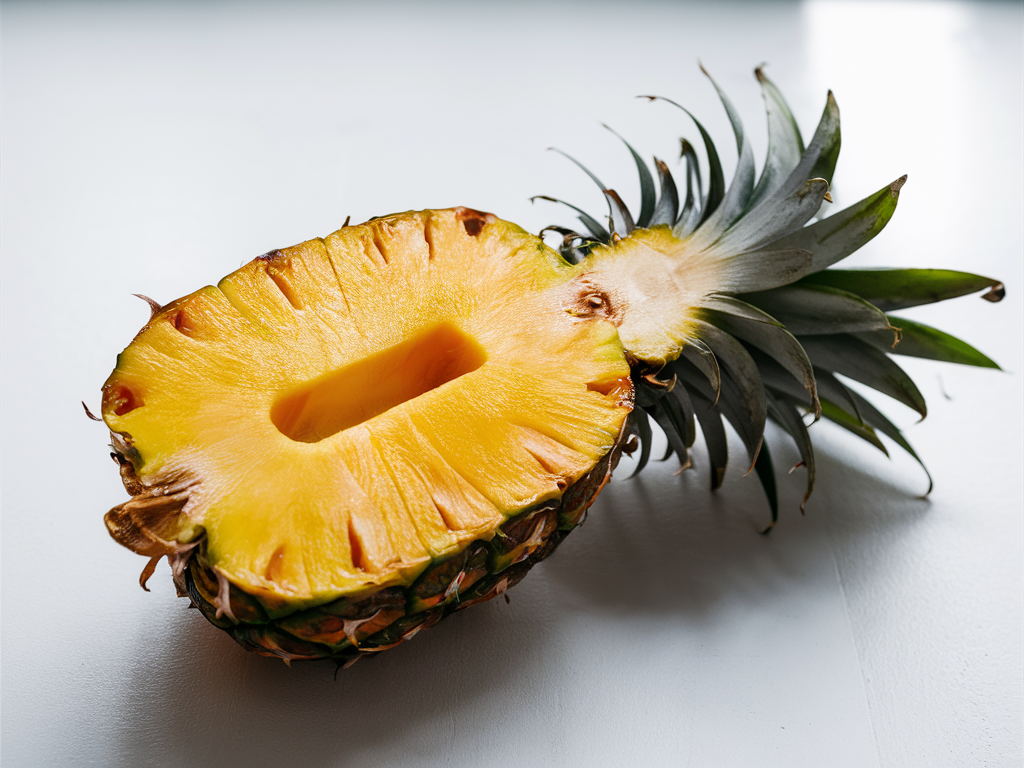Pineapple, with its distinctively sweet-tart flavor and crown-like appearance, is far more than just a tropical delicacy. Native to South America and later spread throughout tropical regions worldwide, this remarkable fruit has been cherished for centuries not only for its vibrant taste but also for its impressive medicinal properties. Nutritionally, pineapple stands out as a powerhouse packed with vitamins, minerals, and unique plant compounds that contribute to its superfruit status. While low in calories, it delivers an abundance of vitamin C, manganese, and the unique enzyme bromelain, making it a valuable addition to any health-conscious diet.
What elevates pineapple to superfruit status isn’t just its nutrient density but also its rare combination of bioactive compounds that work synergistically to provide health benefits that extend far beyond basic nutrition. From supporting digestion to boosting immunity and promoting heart health, this tropical fruit offers a remarkable range of wellness benefits that scientific research continues to uncover.
Benefit #1: Rich in Essential Nutrients
Pineapple stands out as a nutritional powerhouse, particularly when it comes to vitamin C. A single cup (165g) provides approximately 88% of the recommended daily intake of vitamin C, surpassing even oranges in concentration. This makes pineapple one of the most potent fruit sources of this essential immune-boosting vitamin.
Beyond vitamin C, pineapple is exceptionally rich in manganese, containing about 67% of your daily needs per cup. This often-overlooked mineral plays crucial roles in bone formation, metabolism, and antioxidant function. The fruit also supplies meaningful amounts of vitamin B6, copper, thiamin, folate, and potassium.
What’s particularly impressive about pineapple’s nutritional profile is its efficiency – delivering this abundance of nutrients while containing just about 82 calories per cup, along with 2.3 grams of fiber and minimal fat. This combination makes pineapple a nutrient-dense addition to any diet.
Benefit #2: Contains Bromelain, a Powerful Digestive Enzyme
Perhaps the most unique nutritional aspect of pineapple is bromelain, a group of protein-digesting enzymes found almost exclusively in this fruit. Bromelain is particularly concentrated in the stem but is present throughout the entire fruit.
These enzymes break down protein molecules into their building blocks, such as amino acids and small peptides. This protein-digesting action makes pineapple particularly beneficial when consumed with protein-rich meals, as it can help improve digestion and reduce bloating.
For those with digestive disorders like irritable bowel syndrome (IBS) or inflammatory bowel disease (IBD), the natural digestive enzymes in pineapple may help alleviate symptoms by promoting more efficient digestion. Many people report reduced discomfort after meals when including fresh pineapple as part of their diet.
To maximize these digestive benefits, consider enjoying fresh pineapple as a dessert after protein-heavy meals or including it in marinades for meat, as bromelain can also help tenderize tough cuts.

Benefit #3: Anti-Inflammatory Properties
The bromelain found in pineapple does more than aid digestion – it’s also a potent anti-inflammatory compound. Research has shown that bromelain can inhibit the production of inflammatory molecules in the body, potentially reducing pain and swelling associated with inflammatory conditions.
These anti-inflammatory effects may be particularly beneficial for people with arthritis. Studies have demonstrated that bromelain supplements can be as effective as some anti-inflammatory medications in reducing pain and improving mobility in people with osteoarthritis and rheumatoid arthritis.
Athletes and those recovering from injuries may also benefit from pineapple’s anti-inflammatory properties. The fruit may help reduce exercise-induced inflammation, potentially speeding recovery and reducing soreness after intense physical activity.
While consuming pineapple alone may not provide bromelain in therapeutic amounts for severe inflammatory conditions, regular consumption as part of an anti-inflammatory diet may contribute to overall reduced inflammation.
Benefit #4: Immune System Support
Pineapple offers impressive immune-boosting benefits through multiple mechanisms. Its exceptional vitamin C content serves as the foundation of its immune-supporting properties, as this vitamin is essential for the function of various immune cells and has been shown to reduce the duration and severity of colds.
Beyond vitamin C, bromelain exhibits immunomodulatory effects, helping to regulate immune responses and potentially enhancing the body’s ability to fight infections. Studies have shown that bromelain can activate various immune cells and may help combat certain bacterial and viral infections.
The micronutrient profile of pineapple, including copper, vitamin B6, and folate, further contributes to optimal immune function by supporting various aspects of the immune response. Additionally, pineapple contains various antioxidants that help protect immune cells from oxidative damage.
For maximum immune support during cold and flu season, consider enjoying fresh pineapple regularly or incorporating it into smoothies with other immune-boosting foods like ginger and turmeric.
Benefit #5: May Help Fight Cancer
The potential anti-cancer properties of pineapple stem primarily from its bromelain content and rich antioxidant profile. Laboratory and animal studies have shown that bromelain may help prevent the formation, growth, and spread of cancer cells through various mechanisms.
Research suggests that bromelain may induce apoptosis (programmed cell death) in certain cancer cells while leaving healthy cells unharmed. Studies have shown particularly promising results for breast, colon, lung, and skin cancers in laboratory settings.
The antioxidants in pineapple, including vitamin C, beta-carotene, and various flavonoids, provide additional cancer-fighting potential by neutralizing free radicals that can damage DNA and lead to cancer development.
While these findings are promising, it’s important to note that most research has been conducted in laboratory settings and animal models. Human studies are limited, and pineapple consumption should be viewed as one component of a comprehensive cancer prevention strategy rather than a treatment.
Benefit #6: Promotes Bone Health
Pineapple contributes to bone health primarily through its exceptional manganese content. With one cup providing 67% of the daily recommended intake, pineapple is one of the richest fruit sources of this mineral that’s essential for bone formation and mineralization.
Manganese works synergistically with other nutrients found in pineapple, such as vitamin C, to support collagen formation – the organic foundation upon which bone minerals are deposited. This collagen framework is crucial for bone flexibility and strength.
The fruit also contains trace amounts of other bone-supporting minerals like copper and zinc. Additionally, bromelain’s anti-inflammatory properties may help reduce inflammation associated with joint conditions like arthritis, indirectly supporting skeletal health.
For those concerned about bone health, particularly women approaching menopause and older adults, including pineapple as part of a balanced diet rich in calcium and vitamin D may contribute to maintaining bone density and reducing fracture risk.
Benefit #7: Improves Eye Health
Pineapple offers several nutrients that support optimal vision and eye health. Its high vitamin C content is particularly beneficial, as this antioxidant helps protect the eyes from oxidative damage and may reduce the risk of cataracts.
While not as rich in beta-carotene as orange or yellow vegetables, pineapple does contain modest amounts of this important carotenoid that can be converted to vitamin A – essential for maintaining the cornea and conjunctival membranes.
The fruit also contains small amounts of other eye-supporting nutrients like copper and zinc. Additionally, bromelain’s anti-inflammatory properties may help reduce inflammation associated with certain eye conditions.
Research suggests that regular consumption of vitamin C-rich fruits like pineapple may help slow the progression of age-related macular degeneration (AMD), particularly when consumed as part of a diet rich in other antioxidant-containing foods.

Benefit #8: Aids Weight Loss
Pineapple makes an excellent addition to a weight management plan for several reasons. With just 82 calories per cup, it provides a naturally sweet treat with minimal calories and virtually no fat, making it a satisfying alternative to higher-calorie desserts.
The fiber content in pineapple, approximately 2.3 grams per cup, helps promote fullness and may help reduce overall calorie intake. Additionally, pineapple has a high water content (about 87%), which contributes to its satiating effect without adding calories.
Some research suggests that bromelain may help boost metabolism and fat breakdown. While more human studies are needed, preliminary evidence indicates that the enzymes in pineapple might help optimize fat metabolism.
For weight management benefits, consider enjoying fresh pineapple as a snack between meals, adding it to yogurt or oatmeal for breakfast, or freezing chunks for a refreshing alternative to high-sugar frozen desserts.
Benefit #9: Enhances Skin Health
Pineapple offers multiple benefits for skin health, primarily through its outstanding vitamin C content. This essential vitamin is crucial for collagen synthesis, the protein that provides structure, elasticity, and strength to your skin. Regular consumption of vitamin C-rich foods like pineapple may help reduce the appearance of fine lines and wrinkles.
The bromelain in pineapple provides additional skin benefits through its anti-inflammatory and mild exfoliating properties. This enzyme complex may help reduce inflammation associated with acne and other skin conditions while gently dissolving dead skin cells.
Pineapple’s antioxidants, including vitamin C, manganese, and various flavonoids, help protect skin cells from oxidative damage caused by UV exposure and environmental pollutants – major contributors to premature skin aging.
Beyond consumption, pineapple can be applied topically as part of DIY face masks for gentle exfoliation. Simply applying fresh pineapple juice to the skin may help brighten the complexion and reduce dark spots, though it should be used cautiously as the acids can be irritating to sensitive skin.
Benefit #10: Supports Oral Health
While acidic fruits are often considered problematic for dental health, pineapple offers some unique benefits for oral hygiene. The bromelain in pineapple has natural antimicrobial properties that may help combat bacteria associated with plaque formation and gum disease.
Research suggests that the enzymes in pineapple can help reduce biofilm formation – the sticky bacterial layer that leads to tooth decay and periodontal disease. Additionally, bromelain’s anti-inflammatory properties may help reduce gum inflammation associated with gingivitis.
Pineapple’s natural ability to combat bad breath is another oral health benefit. The fruit’s enzymes can help break down food particles trapped in the mouth that contribute to halitosis, while its fresh flavor helps mask unpleasant odors.
To balance the potential benefits with concerns about acidity, enjoy pineapple as part of meals rather than as frequent snacks, rinse your mouth with water afterward, and wait at least 30 minutes before brushing to avoid enamel damage from the combination of acid and brushing.
Benefit #11: Natural Cough and Cold Remedy
Pineapple has earned a reputation as a natural remedy for respiratory ailments, particularly coughs and congestion. Research suggests that bromelain may help break down and thin mucus, making it easier to expel from the respiratory tract and potentially alleviating symptoms of bronchitis, sinusitis, and other respiratory conditions.
A study published in “Der Pharma Chemica” found that pineapple extract was effective in treating tuberculosis by helping dissolve mucus in the lungs. The researchers found it was five times more effective than cough syrup at reducing cough symptoms and clearing mucus.
The high vitamin C content in pineapple further supports its role in respiratory health by potentially reducing the duration and severity of cold symptoms. Additionally, the fruit’s anti-inflammatory properties may help soothe sore throats and reduce inflammation in the respiratory tract.
A popular traditional remedy combines fresh pineapple juice with honey, ginger, and a pinch of salt for a natural cough syrup. This mixture combines the mucus-thinning properties of pineapple with the soothing effects of honey and the additional anti-inflammatory benefits of ginger.
Benefit #12: Improves Heart Health
Pineapple offers several compounds that support cardiovascular health through different mechanisms. Its potassium content (about 180mg per cup) helps counterbalance sodium in the body, potentially helping regulate blood pressure – a major risk factor for heart disease.
The vitamin C and other antioxidants in pineapple help protect the arterial walls from oxidative damage, potentially reducing the risk of atherosclerosis – the buildup of plaque in arteries that can lead to heart attacks and strokes.
Perhaps most significant is bromelain’s potential cardiovascular benefits. Research suggests that this enzyme complex may help prevent excessive blood platelet aggregation (clumping), potentially reducing the risk of dangerous blood clots without the side effects of some pharmaceutical blood thinners.
Additionally, some studies indicate that bromelain may help reduce levels of certain blood lipids and fibrinogen (a clotting factor), potentially improving overall cardiovascular risk profiles. While these findings are promising, most research has been conducted in laboratory settings, and more human studies are needed.

How to Include More Pineapple in Your Diet
Selecting the perfect pineapple is the first step to enjoying its benefits. Look for a fruit with a firm, plump body with no soft spots or bruising. The leaves in the crown should be fresh and green, and the base should emit a sweet aroma. Contrary to popular belief, the ease with which a leaf pulls out is not a reliable ripeness indicator.
To store pineapple for maximum freshness and nutrient retention, keep whole pineapples at room temperature if you plan to consume them within 2 days. For longer storage, refrigerate the whole fruit for up to 5 days. Once cut, store pineapple in an airtight container in the refrigerator and consume within 3-5 days.
Pineapple’s versatility makes it easy to incorporate into your diet:
- Add fresh chunks to morning smoothies or yogurt bowls
- Include in savory dishes like stir-fries, curries, and tacos
- Use in marinades for meats (particularly effective with tougher cuts)
- Grill pineapple rings for a caramelized dessert or burger topping
- Blend into salsas with jalapeño, cilantro, and lime
- Freeze chunks for a refreshing snack or natural popsicle
- Add to overnight oats or chia puddings
- Incorporate into homemade popsicles or sorbets
Potential Side Effects and Precautions
While pineapple offers numerous health benefits, certain individuals should exercise caution when consuming this fruit. The bromelain in pineapple can cause mouth and tongue irritation, appearing as a temporary burning sensation, tenderness, or small bumps. This reaction is more common when consuming large amounts of particularly fresh pineapple.
Some individuals may experience allergic reactions to pineapple, ranging from mild itching to more severe symptoms like swelling, hives, or difficulty breathing. Those with known allergies to latex may be more susceptible to pineapple allergies due to cross-reactivity.
Bromelain can act as a mild blood thinner, potentially increasing the risk of bleeding when consumed in large amounts or as supplements. Individuals taking blood-thinning medications, including aspirin, warfarin, or heparin, should consult with healthcare providers about appropriate pineapple consumption.
The acidity of pineapple may cause or worsen acid reflux or heartburn in susceptible individuals. Those with gastroesophageal reflux disease (GERD) or similar conditions should monitor their tolerance to pineapple.
While there’s no strict daily limit for pineapple consumption, moderation is advisable. A typical serving of 1 cup (about 165g) of fresh pineapple chunks daily is generally considered safe and beneficial for most people when consumed as part of a varied diet.
Conclusion
Pineapple truly deserves its classification as a superfruit, offering an impressive array of health benefits that extend far beyond basic nutrition. From its powerful digestive enzymes and anti-inflammatory properties to its immune-boosting effects and potential role in disease prevention, this tropical treasure supports wellness in multiple ways.
What makes pineapple particularly valuable is its versatility – not only as a delicious, refreshing food but also as a functional ingredient that can enhance both the flavor and nutritional value of countless dishes. Whether enjoyed fresh, grilled, frozen, or incorporated into both sweet and savory recipes, pineapple offers a convenient and delicious way to boost your nutrient intake.
While pineapple should be consumed in moderation as part of a balanced diet – particularly for those with specific health conditions – its unique combination of enzymes, vitamins, minerals, and bioactive compounds makes it one of nature’s most remarkable health-supporting foods. By incorporating this tropical superfruit regularly into your meals and snacks, you can enjoy its delicious flavor while supporting your body’s optimal function and wellbeing.

